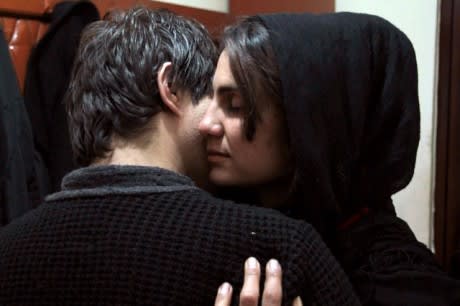Noted in its opening title cards as the true story of many, Wajma sets the tone for an uncompromising look at modern Afghan state and its treatment of women. As such, the title, An Afghan Love Story, has a bitter irony to it, suggesting that love is an impossibility in a land structured around financially and socially appropriate unions and antiquated gender expectations.
Still, as Barmak Akram's naturalistic, low budget drama opens, the metrosexual Mustafa (Abdulsatar) is found wooing the bashful, younger Wajma (Bahar) at a large social gathering, whispering sweet nothings in her ear. The couple initially seem enamoured with each other, even though Mustafa's insistence that they meet only at specific times, with her only able to enter the apartment when he leaves out a sign that the coast is clear, suggests impending doom.
These early stabs at romance are, in part, what is problematic about this politically motivated film. While Mustafa's proprietary, almost insulting, way of treating Wajma—keeping their relationship hidden from the world while whispering to his best friend that he's found "the one"—gives us a foreboding sense of cultural influence, their actual conversations and relationship is as shallow as it gets. Their conversations never go beyond the superficial and their times together are spent mostly giggling and standing around.
This is why the eventual shift in narrative—when Wajma reveals her pregnancy—is more adjacent-horrifying than actively devastating. While it's easy to be infuriated by Mustafa's callous indifference towards Wajma's plight, and even easier to vilify her father for beating her and locking her in a shed, there's little development of character to invite us into this individual tale and connect with the events.
Obviously, the intention of the film is to show the one-sidedness and single-minded treatment of unauthorized teen romance, which does give outsiders some insight onto the plight of modern Afghanistan, but with a little more attention to basic storytelling elements, Wajma might have worked on its own as a compelling drama unto itself. As it stands, it's merely a presentation of an issue that might have been better suited for a documentary format.
(Kabuli Film)Still, as Barmak Akram's naturalistic, low budget drama opens, the metrosexual Mustafa (Abdulsatar) is found wooing the bashful, younger Wajma (Bahar) at a large social gathering, whispering sweet nothings in her ear. The couple initially seem enamoured with each other, even though Mustafa's insistence that they meet only at specific times, with her only able to enter the apartment when he leaves out a sign that the coast is clear, suggests impending doom.
These early stabs at romance are, in part, what is problematic about this politically motivated film. While Mustafa's proprietary, almost insulting, way of treating Wajma—keeping their relationship hidden from the world while whispering to his best friend that he's found "the one"—gives us a foreboding sense of cultural influence, their actual conversations and relationship is as shallow as it gets. Their conversations never go beyond the superficial and their times together are spent mostly giggling and standing around.
This is why the eventual shift in narrative—when Wajma reveals her pregnancy—is more adjacent-horrifying than actively devastating. While it's easy to be infuriated by Mustafa's callous indifference towards Wajma's plight, and even easier to vilify her father for beating her and locking her in a shed, there's little development of character to invite us into this individual tale and connect with the events.
Obviously, the intention of the film is to show the one-sidedness and single-minded treatment of unauthorized teen romance, which does give outsiders some insight onto the plight of modern Afghanistan, but with a little more attention to basic storytelling elements, Wajma might have worked on its own as a compelling drama unto itself. As it stands, it's merely a presentation of an issue that might have been better suited for a documentary format.
